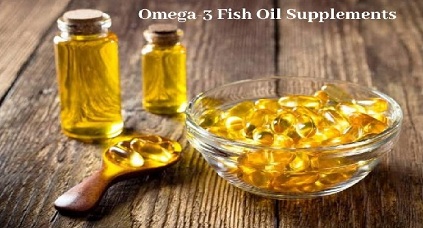Omega-3 Supplements Provides Cardioprotection And Improves Heart Health According To New Authoritative Meta-Analysis Involving 40 Studies, 135,267 Participants
Source: Omega-3 Supplements Sep 17, 2020 4 years, 7 months, 4 days, 11 hours, 55 minutes ago
Omega-3 Supplements: A new meta-analysis study of 40 past studies involving a total of more than 135,267 participants indicates that EPA and DHA supplementation reduces multiple types of cardiovascular risk and also improves hearth health.

The study findings were published in the peer reviewed journal: Mayo Clinic Proceedings.
https://www.mayoclinicproceedings.org/article/S0025-6196(20)30985-X/fulltext#%20
The study findings provide the most comprehensive analysis of the role of omega-3 dosage on cardiovascular prevention to date. The meta-analysis, which is an in-depth review of 40 clinical trials, provides authoritative evidence for consuming more EPA (eicosapentaenoic acid) and DHA (docosahexaenoic acid) omega-3 fats.
The study concludes that EPA and DHA omega-3 intake is associated with reduced risk of coronary heart disease (CHD) events, the cause of 7.4 million deaths globally each year, and reduced risk of myocardial infarction (heart attack), including fatal heart attack.
Significantly, the research found that EPA+DHA supplementation is associated with a statistically significant reduced risk of:
- Fatal myocardial infarction (35 percent)
- Myocardial infarction (13 percent)
- Coronary Heart Disease events (10 percent)
- Coronary Heart Disease mortality (9 percent)
Dr Carl “Chip” Lavie, MD, a cardiologist at Ochsner Health in New Orleans, LA, USA, and one of the study authors told Thailand Medical News, “The detailed meta-analysis findings supports the notion that EPA and DHA intake contributes to cardioprotection, and that whatever patients are getting through the diet, they likely need more.”
Interestingly cardiovascular benefits appear to increase with dosage. The study team found that adding an extra 1000 mg of EPA and DHA per day decreased the risk of cardiovascular disease and heart attack even more: risk of cardiovascular disease events decreased by 5.8 percent and risk for heart attack decreased by 9.0 percent. The study looked at dosages of up to 5500 mg/day.
Importantly this study findings corroborate the results of an earlier meta-analysis from Harvard School of Public Health, published in fall 2019, that looked at EPA and DHA dosage using the 13 largest clinical studies.
https://pubmed.ncbi.nlm.nih.gov/31567003/
However this new study new encompasses more than triple the number of studies, which represents the totality of the evidence to date and includes more than 135,000 study participants.
Co-author Aldo Bernasconi, PhD, Vice President of Data Science for the Global Organization for EPA and DHA Omega-3s (GOED), Salt Lake City, UT, USA, which commissioned this study added, “When separate analyses arrive at similar results, that’s not only validating; it also underscores the science base needed to inform future intake recommendations. Because this paper included more studies and a
ll dosages, the estimates for a dose-response are more precise and the conclusions stronger.”
Both EPA and DHA omega-3s are long-chain, marine-based fatty acids. Eating fish, particularly fatty fish such as salmon, anchovies and sardines, is the optimal way to get EPA and DHA omega-3s, since fish also provides other beneficial nutrients. However, most people around the world eat much less than the amount of fish recommended, so supplementing with omega-3s helps close the gap.
Dr Lavie further added, “Individuals should consider the benefits of omega-3 supplements, at doses of 1000 to 2000 mg per day far higher than what is typical, even among individuals who regularly eat fish. Given the safety and diminished potential for interaction with other medications, the positive results of this study strongly suggest omega-3 supplements are a relatively low-cost, high impact way to improve heart health with few associated risks and should be considered as part of a standard preventive treatment for most patients with cardiovascular diseases and those recovering from myocardial infarction.”
For more on
Omega-3 Supplements, keep on logging to Thailand Medical News.
